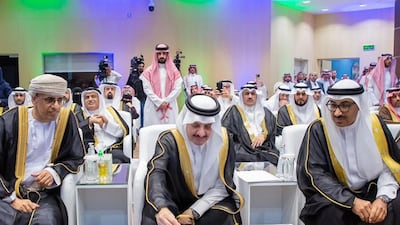Saudi Arabia has inaugurated the Gulf electricity market project's connection platform with Iraq, and the electricity exchanged with the neighbouring country could contribute to energy sales volumes reaching up to $300 million annually.
The plan is to expand the initiative to other countries, Prince Saud bin Nayef, the governor of Saudi Arabia's eastern province, said during the platform's inauguration at the GCC Interconnection Authority's headquarters in Al Dammam city.
“This platform creates opportunities for the Gulf market to facilitate the exchange and trade of electric power among the countries of the Gulf Cooperation Council and the Republic of Iraq,” Yaqoob Saif Al Kiyumi, vice chairman of GCCIA, said in a statement on Wednesday.
“It empowers Gulf nations to enter into bilateral or multilateral agreements and to reserve the essential transmission lines needed for the transfer of electric power among them.”
In June, the GCCIA launched plans to connect electricity-poor Iraq to its grid to help meet its growing demands for power.
Iraq’s electricity demand in summer reaches more than 35 gigawatts, but its obsolescent plants and grid can produce only about 25 gigawatts, resulting in lengthy power cuts and the use of contaminating and expensive private diesel generators.
Despite billions of dollars spent on infrastructure since the 2003 US-led invasion that toppled Saddam Hussein, many Iraqi cities and towns still experience severe power cuts and rolling blackouts.
The country's electricity network losses are among the highest in the world. According to the Iraq Energy Institute, about 30 per cent to 50 per cent of electricity generated is lost due to an inadequate transmission and distribution network.
Iraq's electricity demand is set to double between 2019 and 2030, and its supply shortfall will widen as the population grows by more than one million a year, according to the International Energy Agency.
“The launch of the Gulf market electricity connection project with Iraq marks a promising step towards reaching other international networks,” Mr Al Kiyumi said.
The platform will allow Iraq to exchange and trade electric power with the GCC countries collectively or individually, Ahmed Al-Ebrahim, chief executive of the GCCIA, said.
“The platform also facilitates cross-border trade among the Gulf countries in a streamlined and efficient manner, in addition to reserving the necessary transmission lines for electric power transfer among these countries,” he said.
The GCCIA expects the exchange of two terawatts of power with Iraq during the summer period. The trade is expected to extend into the winter season, reaching around half a terawatt.
While the electricity exchanged with Iraq could contribute to energy sales volumes amounting to $200 million to $300 million annually, this estimate could increase significantly in a gas shortage.
The figure could reach $232 million when using liquefied natural gas or $438 million if oil is used for electricity generation, according to Mr Al-Ebrahim.
The electricity connection project would save Iraq around $100 million when using liquefied natural gas or $215 million when using oil for power generation.
Project expansion in UAE, Kuwait and Oman
Following a feasibility study, the authority is undertaking three expansion projects involving Kuwait and UAE, and direct interconnection with Oman, according to the statement.
It has also explored the possibility of expanding by signing initial pacts to study its interconnection with the electricity networks of Jordan and Egypt.
The project with Kuwait is set to be completed in December 2024, and with the UAE by late 2025.
The GCCIA's project has contributed to estimated savings of about $3 billion since its inception, compared to the investment and operational costs, which totalled about $1.5 billion.

